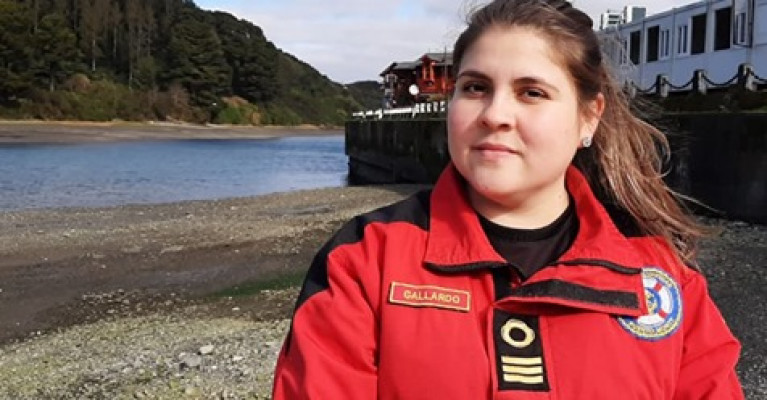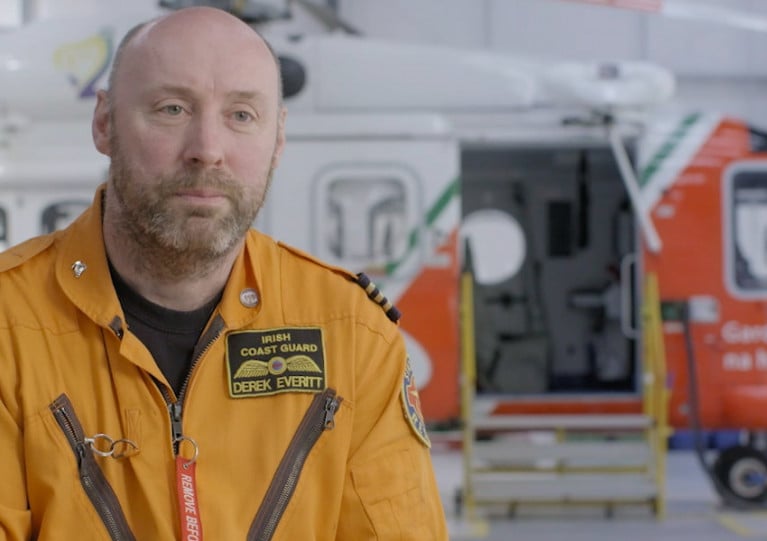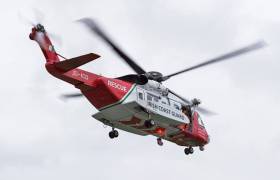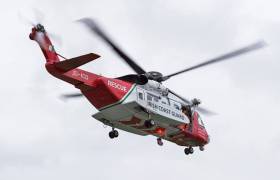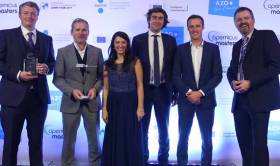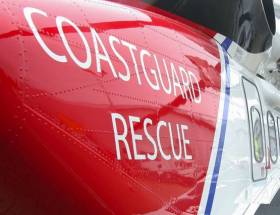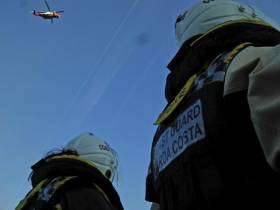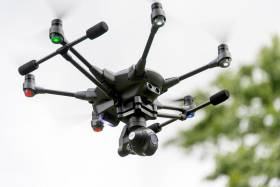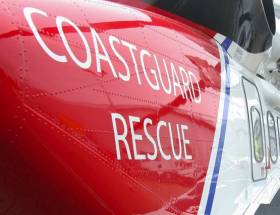Displaying items by tag: SAR
CHC Ireland Initiates High Court Challenge Over SAR Contract
CHC Ireland has confirmed that it has initiated a High Court challenge to the validity of the tender procedure for the Irish Coast Guard’s new search and rescue contract.
Earlier this month, Minister for Transport Eamon Ryan confirmed that Bristow Ireland Ltd is the preferred bidder for the next ten-year search and rescue (SAR) contract, costing 670 million euro ex VAT.
Over 140 people have been employed by CHC Ireland at the four bases over the past 20 years of the current contract, which cost 60 million euro annually.
Bristow Ireland Ltd is a subsidiary of the Bristow group which runs search and rescue services for Britain, the Netherlands and the Falkland Islands.
CHC director of operations and accountable manager Ireland Rob Tatten said that “upon considering the outcome of the tender process as notified to CHC, CHC is concerned that there are a number of flaws in the conduct of the competition”.
“In view of the strict time limits in Irish law for taking steps to protect our rights we were left with no option but to initiate proceedings to challenge the outcome of the process,” Tatten said in a statement.
“CHC Ireland has submitted a tender which it believes is innovative and represents the best value to the taxpayer and the best outcome for the Irish Coast Guard helicopter search and rescue service,” he said.
“Foremost in our thoughts are the staff who provide the service and the people who rely on it. This is consistent with our philosophy of putting people at the forefront of everything, as we have done for the past 20-plus years,” Tatten said.
Provision of a fixed wing aircraft is also included in the new Irish contract from 2025, which provides for the Air Corps to take over this element of the service after five years.
There have been fears about job losses among CHC staff once the contract is transferred. Each of the four Irish Coast Guard bases contracted to CHC Ireland is staffed by about 35 people, including up to nine pilots, winch crew and engineers, along with staff responsible for rosters, flight operations and engineering supervision.
Senator Gerard Craughwell, who has welcomed the awarding of the contract to Bristow, has called on Bristow to make a statement that it will “start considering a transfer of employment”.
Existing staff with CHC Ireland are “brave, solid heroes who put their lives on the line daily to save lives”, he said, and they deserved assurances.
The Irish Coast Guard responded to 2,699 incidents last year – the second highest number in five years -with SAR helicopters flying 829 missions.
International Maritime Rescue Federation Calling Women (& Men) in Search & Rescue Survey
A survey by the International Maritime Rescue Federation (IMRF) has been launched to try to understand the current gender balance in search and rescue (SAR) organisations all around the world - whether paid professional or volunteer, national, regional or local.
The IMRF is the international NGO working to develop and improve maritime search and rescue (SAR) capacity and capability around the world. A membership organisation with members located across all continents, it organises training, shares best practice and act as the voice of the industry.
However, there is currently no definitive study that assesses the level of representation of women in the SAR sector, or looks at the roles that they fill. As a result, the IMRF has developed a survey to ask both women and men working in SAR about their experiences, work and aspirations.
Theresa Crossley, CEO IMRF explains: “Quite simply if we want to try and make sure there’s equality of opportunity across the sector, first we need to understand what the current status is, what the barriers are and where those opportunities may be.
“We are asking anyone who works in maritime search and rescue – and that could be front line operations or back office support, full or part time, volunteer or professional, male or female, to complete the survey. It only takes about five minutes, but the information will be incredibly useful in helping us to plan the next steps. We want to ensure that everyone has an equal opportunity to get involved and/or build the career they want in this inspiring sector. The link to the survey can be found on our home page www.imrf.org.uk ”
The #WomeninSAR initiative was launched last year (2019), supporting the International Maritime Organization’s (IMO) Empowering Women in Maritime initiative. The project aims to increase the representation of women in the maritime sector and to support and raise the profile of women in maritime search and rescue. Last year a new IMRF #WomeninSAR award was launched to recognise exceptional leading women in the sector at the annual IMRF Awards and the first all-women training was held in Morocco in conjunction with the IMO.
The IMRF #WomeninSAR survey can be found here:
Vertical Magazine has shared video of a roundtable discussion on helicopter rescues from earlier this year, featuring a member of the Rescue 116 crew with the Irish Coast Guard.
Helicopter winchman Derek Everitt was in attendance at the HAI Heli-Expo in Anaheim, California this past January, where he took part in a talk with fellow professionals about their ‘life on the wire’.
He was joined by Montana-based air rescue specialist Wil Milam, fire rescue pilot Tony Webber, Canadian rescuer Rob Munday, Las Vegas police flight instructor Dave Callen and hoist operator and paramedic Jason Connell.
The wide-ranging discussion, which can be seen in the video above, included their most memorable rescues — and some of the biggest mistakes they’ve learned from.
For Everitt, his most memorable “screw-up” was as young crewman with the Air Corps involved an unplanned landing at a mountain crossroads for his pilot to impress a high-ranking friend — with embarrassing results.
Vertical has much more on the story HERE.
Industrial Action By Coastguard Pilots Deferred For ‘Further Engagement’
Industrial action by Irish Coast Guard search and rescue pilots scheduled to begin yesterday (Thursday 24 January) has been called off to allow for further talks, as TheJournal.ie reports.
Pilots have sat down with coastguard helicopter operator CHC Ireland a number of times this week to find a resolution to a long-running dispute over rostering hours.
In a letter to the Labour Court yesterday, Brendan O’Hanlon of trade union Fórsa, whose branch Ialpa represents the pilots, wrote: “Following local last-minute discussions designated to avert the pending action, it has been agreed to defer any action to allow further engagement.”
TheJournal.ie has more on the story HERE.
Coastguard Helicopter Pilots Plan Work-To-Rule Over Roster Dispute
The Irish Times reports that helicopter search and rescue pilots with the Irish Coast Guard are to take industrial action from Thursday (24 January) in a dispute over rostering hours.
Brendan O’Hanlon of trade union Fórsa, whose branch Ialpa represents the pilots, said the issues had been an “ongoing problem” for 18 months and that the SAR service “is over-reliant on overtime in order to maintain the level required”.
CHC Ireland, which operates the service, says it has the full compliment of coastguard pilots needed to operate.
From noon on Thursday pilots are set to engage in work-to-rule action, meaning they will work a fixed pattern of six days of work, including three 24-hour shifts, followed by three days off.
The Irish Times has more on the story HERE.
Irish Startup Scoops European Commission Prize at European Satellite Navigation Competition 2017
Donegal based startup, DroneSAR Ltd has won the European Commission prize announced last night (7 November 2017) in Tallinn, Estonia at the awards ceremony for the 14th European Satellite Navigation Competition (ESNC) winners. DroneSAR Ltd were awarded this prize for the development of software which transforms standard “off-the-shelf” drone and mobile device pairings into enhanced search and rescue (SAR) data transmission technology that will save lives.
The European Commission Prize - the Copernicus Masters Services Challenge - is one of a range of challenges and prizes on offer to the 321 finalists in the ESNC competition. It is awarded for innovative uses of the European Commission operated Copernicus program products. The Copernicus program is a European Union Programme aimed at developing European information services based on satellite Earth Observation data and implemented in partnership with Member States, the European Space Agency (ESA) and a number of other European organisations.
DroneSAR Ltd were presented with a cheque from the European Commission, which is in addition to their award as Ireland Region Winner. The Ireland Region Competition for the annual ESNC awards has been organised and sponsored by National Space Centre Ltd since 2012.
DroneSAR Ltd is the brainchild of it’s four co-founders who each possess expertise and skill-sets specific to the world of drone technology, network and satellite communication and SAR coordination and emergency response.
CEO Oisin McGrath said “DroneSAR makes it possible to use affordable, “off-the-shelf” drone technology to expedite successful outcomes during emergency response incidents. It delivers the right data to the right people at the right time when agencies are faced with time and resource constraints. We are delighted to have won this award from the European Commission.
Each member of the DroneSAR team has contributed to realise a software product that will play a major part in ensuring that emergency response time-frames, incident coordination, decisions and successful outcomes will be realised across all sectors of the emergency response and humanitarian relief environment.”
To deliver the service, DroneSAR Ltd has partnered with leading outdoor pursuit software providers Viewranger, global maritime distress software company SafeTRX and medical distress location software, Medimee, all of which will allow victim position data to be sent to DroneSAR software for automatic flight to the location.
Rory Fitzpatrick, CEO National Space Centre said “This is worthy recognition for an outstanding product that has both commercial and lifesaving potential. We are incredibly proud to see this young Irish company perform so strongly on the international stage.”
National Space Centre Ltd is based at Elfordstown Earthstation, Midleton and delivers uplink and downlink services to domestic and international teleport and satellite communications markets.
Marine Notice: Hi-Line Protocols For Helicopter SAR Assistance
#MarineNotice - The latest Marine Notice from the Department of Transport, Tourism and Sport (DTTAS) details the proper hi-line protocols when receiving assistance from a search and rescue helicopter.
The notice follows the findings of last year’s MCIB report into the sinking of the fishing trawler Iúda Naofa off Scotland in January 2015.
As previously reported on Afloat.ie, it was determined that the crew of the trawler lacked knowhow regarding the use of hi-line, which meant they were unable to release an emergency pump dropped to the vessel on a standard clasp from a UK coastguard helicopter.
Full details are included of Marine Notice No 3 of 2017, a PDF of which is available to read or download HERE.
Coastguard Volunteers Want Safeguards From Government
#Coastguard - Coastguard volunteers are calling for the service to be designated as a ‘standalone primary response agency’, as the Irish Examiner reports.
A four-person delegation representing some 1,000 volunteers with the Irish Coast Guard pleaded their case with front bench TDs at Leinster House last week for the search and rescue side of the service to be safeguarded along the lines of the Garda, ambulance and fire services.
Among their complaints, the volunteers cite political manoeuvring at the expense of the service, along with “decisions being made by managers” in the Department of Transport “who have no direct involvement with the emergency services”.
In other coastguard news, volunteers from the Doolin unit were involved in the recovery of the body of a woman following a three-day search off the Cliffs of Moher. The Irish Examiner has more on the story HERE.
Drone Revolution For Search & Rescue Around Ireland’s Coast
#Drones - Remote-piloted aircraft or ‘drones’ could revolutionise search and rescue operations around the Irish coast, as the Southern Star reports.
Following a demonstration by Civil Defence Ireland to West Cork emergency services last week, the Irish Coast Guard and others are now exploring how to utilise drone technology in their SAR efforts.
“It’s an ideal resource in areas like West Cork where you have a lot of upland terrain and rocky headlands as well as huge stretches of coastline,” said civil defence officer Niall Twomey.
“The drone can get into these places much faster than searchers on the ground and do it safely too so it can be a huge assistance.”
Twomey is part of a new project developing drone-based search teams across Ireland, two of which are based in Cork at Skibbereen and Kinsale, utilising the heavy-duty Typhoon H remote-piloted aircraft.
The Southern Star has more on the story HERE.
#Search - Two bodies have been found in the search for the missing crew of a fishing vessel that sank off Scotland's Western Isles early yesterday (Saturday 9 April).
One crew member was taken to hospital by helicopter as UK Coastguard teams from Stornaway and Prestwick joined the Barra RNLI lifeboat, local fishing vessels and Police Scotland in the search and rescue operation for three missing crewmates, as previously reported on Afloat.ie.
One fisherman remains missing after two bodies were recovered yesterday afternoon off Mingulay. Next of kin are aware and police officers are in contact with the families.
Mark Rodaway, national maritime operations commander for the UK Coastguard, said: “Despite an intensive search including the helicopters, lifeboat and other fishing vessels in the area, we have been unable to locate the missing fisherman. Our thoughts are with all those involved.”
Chief Inspector Alastair Garrow of Police Scotland said: "At this time we can confirm that the bodies of two men have been recovered. A third man was rescued and was taken to hospital at Stornoway. He is not seriously injured.
"A fourth man was on the boat and is still missing. The next of kin of all the men have been informed.
Chief Insp Garrow added: "An investigation will be carried out in parallel with the police and the Marine Accident and Investigation Branch (MAIB) and a report will be submitted to the Procurator Fiscal.
"This has been a tragic incident which will impact on the local community. Our thoughts are with the families affected."
The search has now been scaled back pending further information.


























